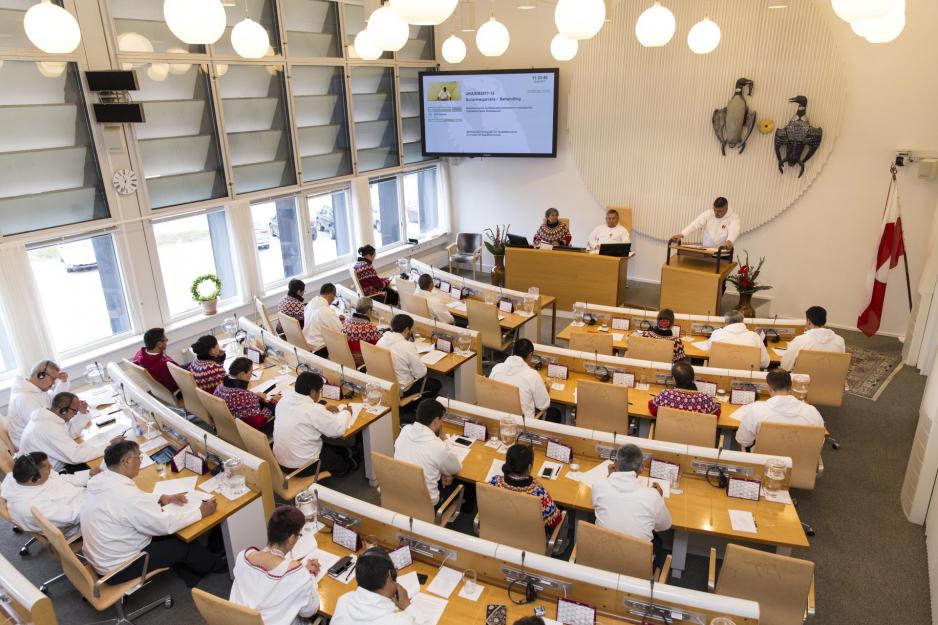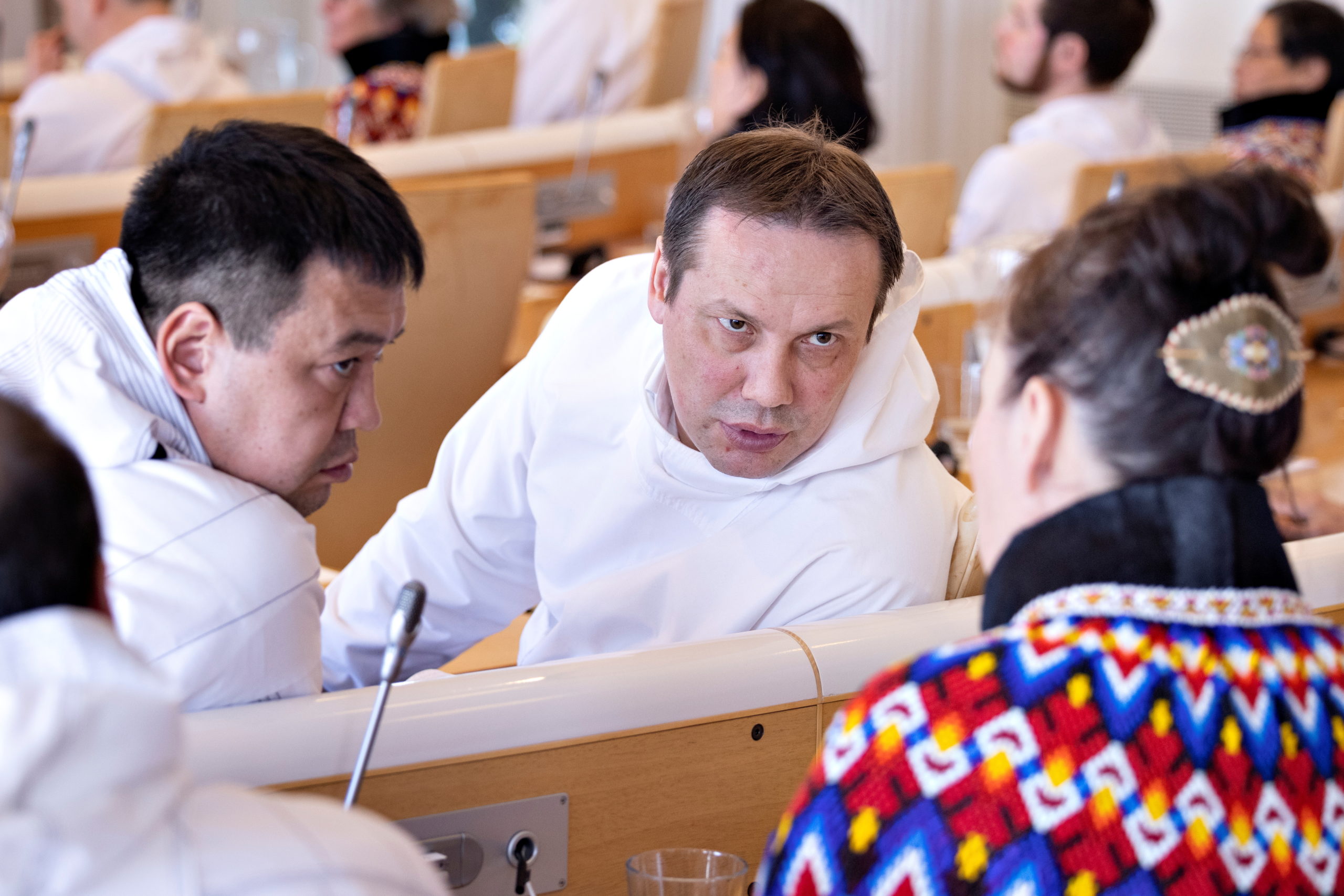Greenland expects the first draft of a new constitution soon
The Constitutional Commission is set to unveil its work by April 1.

It all began in 2016. On a bleak Saturday afternoon in November that year, an urgent meeting of Inatsisartut, Greenland’s parliament, was called. The politicians were all there and every chair in the visitors’ gallery was occupied. Outside in the gloom, soggy snow covered much of of the capital city Nuuk.
But indoors the mood was festive and warm.
As the proceedings peaked, most of the parliament’s 31 members jumped to their feet and applauded. After more than 10 years of debate in and outside of parliament a majority of Greenland’s key lawmakers had voted in favor: Greenland — a Danish colony for more than 250 years but now on its way to the future — was to have its first ever constitution.
During the proceedings one of Greenland’s senior politicians had read aloud from “Sinnattugaq: A Greenlander’s Dream,” Greenland’s first novel, which was published in 1914: “The door is now open; step inside and take up your work. He who works will receive his reward with the Lord’s blessing.”
A month earlier, a new government in Nuuk had explained in its coalition statement precisely what was at stake: “Greenland is irrevocably on its way towards independence and this process demands not only political stability but also national cohesion. The coalition agrees to put forward within this electoral period a draft constitution.”
It took longer than expected, but now a result seems in sight. Naalakkersuisut, Greenland’s government, announced on January 12 that Greenland’s Constitutional Commission is expected to deliver the first ever draft of a constitution for Greenland by April 1. Although earlier deadlines were not met, this time may be different. The government has made no financial allocations for the Constitutional Commission to continue beyond the final drafting effort.
A Greenland republic?
If delivered as announced, the draft will provide us with the first concrete and coordinated suggestion as to which kind of country is envisaged when those in favor (a solid majority of Greenlanders) discuss independence, secession from Denmark and the establishment of a sovereign Greenlandic state.
Who will be the new nation’s natural citizens? How will it be governed, defended and administered? Will it be a republic with a president or will it have a member of the royal family in Denmark as head of state in the same way that King Charles is now head of state in Canada, Jamaica and other nations of the British commonwealth? Will individuals and enterprises be allowed to own land or will the land belong to all as it does today?
The Constitutional Commission has worked very much in private; we know nothing of the actual content of the promised draft. It will be discussed in public and in Inatsisartut only when done. Then, in due course, the 31 members of Inatsisartut may confirm a final document, but, importantly, they will probably not turn the draft into law or otherwise put it into force. There is no clear-cut plan, but judging from previous statements from the key players in Nuuk, the idea is not to rush towards a final constitution and challenge the current constitutional relationship with Denmark.
Most likely, Greenland will still be subject to the constitution of the Danish Kingdom even if Greenland’s future constitution may be agreed upon in Nuuk. The idea — still judging from the mainstream debate on the constitutional process — is not to energize the constitution at present, but to foster public debate and to then allow Greenland to move forward with an almost-ready-to-roll constitution for the day Greenland turns independent, when or if that day comes.
Critics have pulled out
Critics in Greenland have labeled the constitutional process expensive and unnecessary. Atassut, Greenland’s traditionally liberal party which does not support the vision of Greenland’s secession from Denmark, pulled out of the process in 2021.
But others hail the project as indispensable for public discourse on Greenland’s goals, values and way forward.

Erik Jensen, chairman of Siumut, Greenland’s second largest political party and vice chair of the ruling coalition in Nuuk, seemed almost exuberant when I approached him at Naalakkersuisut’s annual New Year’s reception in Copenhagen recently:
“It is now all about getting the public involved and debate going on how our country should be governed in future. Our party’s aim is, as you know, to be independent and masters in our own house. That is the grand ambition and part of the purpose of all this. We still face great challenges in Greenland and we must make the right decisions at the right time, but we think for the long haul,” he said.
No trouble in Denmark
Greenland’s draft constitution is not likely to provoke much furor in Denmark. Since 2009, when self-rule within the Kingdom of Denmark was introduced in Greenland, the government in Nuuk has been free to prepare for a Greenlandic constitution. Deeper problems are likely only if the parliament in Nuuk turns the draft into law and challenges the Constitution of the Danish Realm.
“A country can only have one constitution,” as a key source within Denmark’s government circles puts it.
In 1953, a revision of Denmark’s constitution ended Greenland’s colonial status and made Greenland an integral part of the Kingdom; Greenlanders became Danish citizens. The revision was confirmed by a referendum in Denmark, but no referendum was held in Greenland and dissatisfaction has since grown in Greenland.
In 2004, Josef Motzfeldt, a founder of Inuit Ataqatigiit, the leading party in Greenland’s present coalition government, was among the first to argue why a Greenlandic constitution was needed: “The Greenlandic language, our identity, our sovereignty and our culture does not enjoy direct protection in the Danish constitution. Therefore, the people of Greenland shall have it its own constitution to replace the constitutional legal framework that we feel that we have only on loan from Denmark. A constitution that expresses the identity of the people of Greenland — internally as well as externally,“ Motzfeldt wrote.
Elected politicians
Greenland’s Constitutional Commission consists of elected politicians, who draw on a small group of academics, including the Ombudsman of Iceland, for advice.
As mentioned, the proceedings have been strictly confidential, but the local media have been able to focus instead on a list of controversies, shifts of governments and other obstacles to the commission. Of its seven original members, none are left and its secretariat has been through similar transformations. The commission’s mandate from 2017 had to be rewritten and a proposal to provide the chairman with a salary and a residence caused harsh political debate and an unwanted pause.
In January 2022, Kuupik Kleist, a former premier of Greenland and a long-standing advocate of the constitutional project, was appointed chairman of the commission, but after only four months he relinquished his post, citing frustration with the lack of progress. Last week, Sermitsiaq.ag, a news outlet in Nuuk, reported that Greenland’s government is investigating possible financial misconduct within the commission, and a probe will now run alongside the final drafting and translation.
The working language of the commission is Greenlandic, but according to the secretariat in Nuuk, the draft constitution and an accompanying explanatory report will be published in Danish as well as in Greenlandic.